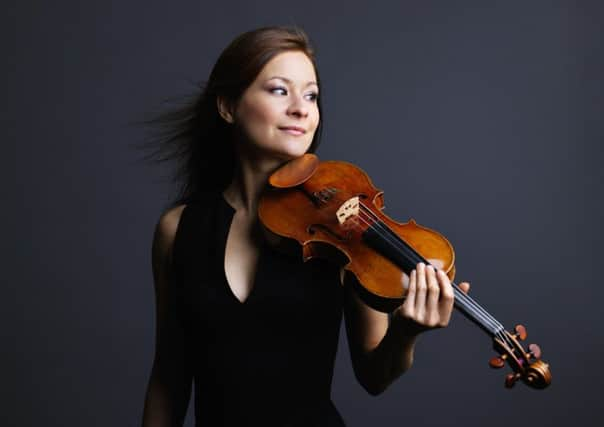Interview: Violinist Arabella Steinbacher on why her Edinburgh performance of a Tchaikovsky favourite will be a one-off


“Yes, it’s always interesting to see how a piece you have played so often changes every time you perform it,” she replies. “As you change as a person, your interpretation of a piece changes also.”
But, of course, there are many other factors at play. “In the case of such popular pieces as the Tchaikovsky the most important thing is to keep flexible,” Steinbacher argues. “Every conductor has their own interpretation of it, and every orchestra plays in a different way, so no matter how much you rehearse, at the end of the day it will be something new, because it just happens at that particular moment.
Advertisement
Hide Ad“It could just be that someone in the orchestra plays a solo a little differently, so there’s that wonderful moment when I have to react. If I’m not flexible, and play it the same way regardless, the magic is lost. But actually, this is the wonderful thing in music. I just try to be inspired by what is happening that moment on stage.”
These surprising moments are what truly excite Steinbacher, who can be certain there will be something genuinely fresh about next Sunday’s Edinburgh Tchaikovsky performance. For even though she’s starred many times with Sanderling and his Dresden orchestra, this week’s tour marks their first collaboration with this particular concerto. “I’m curious to see how it will go,” she says.
As any follower of Steinbacher’s career will know, she devours repertoire with a voracious appetite. She’s noted for having all the core concertos at her fingertips as well as a sizeable stock of challenging contemporary works. Her partnership with conductor Vladimir Jurowski in their 2017 recording of the Britten and Hindemith concertos was recently described by Gramophone magazine as “made in heaven”.
Encouraged by her musical parents to take up the violin at an early age, Steinbacher studied from the age of eight with the celebrated teacher Ana Chumacheno, eventually winning a place in her 20s on the prized Anne Sophie-Mutter Foundation scheme. “Ana Chumacheno was the most important influence in my life, not only in a musical way, but personally,” she recalls. “You have many ups and downs at that age; it was so wonderful to have her help and advice.”
The hunger to learn began early on. “It’s very important for young musicians to learn the big repertoire,” she believes. “It’s the only way to develop as a solo musician. I started with all the classical repertoire, later on adding contemporary pieces. The point is, when I started to give concerts and go on tour, you don’t have time to learn any more new things; or you can, but never in the same way you do as a youngster, when you are exclusively focused on learning.”
These days, she plays the “Booth” Stradivarius, so-called because it was once owned by one Madame Wilhelm von Booth. More recently it belonged to the late great British violinist Iona Brown. Steinbacher has it on loan from the Nippon Music Foundation and holds an affection for it she describes as “like being in a relationship”.
Advertisement
Hide AdDoes such an instrument live up to its seven-figure price tag? “I’ve played it for quite a while now,” says Steinbacher. “It’s a wonderful instrument from 1716. But it’s not only brilliant from the sound perspective like most Strads; it’s very big and bright, yet it also has a lot of warmth and darkness. Mostly though, it’s interesting to see how it has changed over the years, just as I have.”
Many soloists who play Strads describe the process of getting used to them as hard and challenging. “There are instruments that you really need lots of time with to get to know,” says Steinbacher. “With this one I really had an immediate, close connection. It depends on the instrument.”
Advertisement
Hide AdThe impression gleaned of Steinbacher in the course of conversation is that of composure and contentment. But that’s something she has consciously nurtured in striking a balance between the relentless travelling of concert life and the tranquillity she seeks when switching off.
“That is so important for every artist,” she says. “I always say that making music is the easiest part. The most difficult is what is happening all around: all the craziness of travelling; dealing with jet lag. It needs a lot of discipline, also how to stay focused, not to get distracted too much by all that’s happening around you. I do meditation, try to save my energy. That way I can go on stage and feel completely free.”
August, though, is a no-no when it comes to working. “I used to do festivals then, but now I prefer just being at home, enjoying the quietness and the opportunity to refresh my thoughts.”
Arabella Steinbacher performs Tchaikovsky’s Violin Concerto with the Dresden Philharmonic at the Usher Hall, Edinburgh on 27 May at 3pm. Michael Sanderling also conducts Shostakovich’s Symphony No 5. Tel: 0131-228 1155 / www.usherhall.co.uk